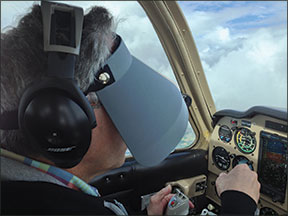
What does it take to become an airline pilot? There are countless YouTube videos and posts on social media that try to answer that, as well as plenty of books that cover that question. Let’s keep this short. This is meant to focus on actionable steps you must take. The basic ingredients are time, money, and a modicum of intelligence.

First, this might not be the most obvious, but you must obtain a First-Class Medical Certificate. Find an AME, an "Airmen Medical Examiner." AMEs are doctors that the FAA has credentialed to give physicals to obtain your pilots license. Go to: Designee Locator Search (faa.gov)
They cost a couple hundred dollars depending on the region you're in. It’s not worth moving forward with your training if you can’t pass that. Don’t waste your time on a Second or Third Class medical because they're cheaper. This will be a waste of time and money as you progress with your flight training and later on find you can't qualify for a First-Class Medical Certificate.
To obtain a first class medical, a doctor will test your blood pressure, urine, lung function, eyesight - near and far, hearing, color vision, and balance. You will also need to get an EKG starting on your 35th birthday and every year after you turn 40. There are many medications that one can NOT take to maintain a First-Class Medical. The FAA is getting better every year at tracking information. You must list every medical visit for the last three years. Needless to say, any kind or recreational drugs are absolutely forbidden, and you must also list any DUI or infraction with law enforcement, too.

Next, having a bachelor's degree is highly favorable. It does't matter what you get your degree in, but having a 4-year bachelor's degree has historically been a requirement. The job market for airline pilots is constantly evolving and for a few years, due to other hiring factors, airlines were hiring pilots without a 4-year college degree. That's not to say it's impossible to get a job with a good airline without a college degree, but when the job market becomes competitive, it can handicap your ability to compete with other pilots who have one.
Along with obtaining a bachelor's degree, you must obtain all the required pilots licenses, and they are as follows:
*all these times depend on how much time you can devote to flying and ground school and studying.

Private pilot – usually takes about 3 to 4 months, Cost: $12,000-$20,000

Instrument Rating – 4 to 6 months, Cost: $7,000 - $9,000

Multi-Engine Rating – a couple weeks to a month, Cost: $2,000 - $6,000
Multi-Engine Instrument Rating - About two weeks, Cost: $10,000, 2 – 4 weeks

CFI (Certified Flight Instructor) rating – about 2 months, Cost: $7,000 - $12,000

ATP (Airline Transport Pilot), – about a week Cost: $12,600 - $19,000
Other requirements for an ATP certificate include:
Be at least 23 years old
Be able to read, speak, write, and understand English
Have at least 1,500 hours of total flight time, including:
500 hours of cross-country time
100 hours of night time
50 hours in the class of airplane for the rating
75 hours of instrument time
250 hours of time as a pilot in command
*The required times can be reduced:
Restricted ATP (R-ATP):
Pilots can obtain a Restricted ATP certificate with fewer flight hours, which allows them to serve as a first officer before reaching the 1,500-hour requirement.
Military Pilots:
Military pilots may be eligible for reduced flight time requirements for an ATP certificate.
Collegiate Aviation Programs:
Graduates of FAA-approved collegiate aviation programs may also be eligible for reduced flight time requirements for an ATP certificate.
ATP Certification Training Program (CTP):
The FAA requires completion of an ATP-CTP course as a prerequisite to taking the ATP written exam and checkride.
 Total cost to go from zero time to holding anATP can cost anywhere between $90,000 to $120,000
Total cost to go from zero time to holding anATP can cost anywhere between $90,000 to $120,000
And that doesn't include four years of college. which for 2025, expect $27,146 per year or $108,584 over 4 years.

There is also the option of joining the military which will take an 8 to 10 year commitment. There are some pros and cons to this route. To fly in the military you will still need a college degree. Contact your local military recruitment center for information on the requirements to join and how long the current commitment is, becuase it does change over time depending on needs.

Bottom line? From the start of college and flight training to possibly getting hired by your first airline you should plan on about four to six years, depending on how much financial support you have. And during that period, expect some pretty intense studying and training. You are gambling that the industry will allow you to get a job, so you can begin the climb up the ladder to justify that time and expense.
Do NOT pursue an airline career for the money. You must have the love of flying in your heart, because there can be dark times in your career, and without that love and drive, you can become stressed out and miserable.
Lastly, maintaining a work-life balance with your partner and family can be VERY challening. You will basically be away from home half the time and will only get a good schedule, especially with your career airline, much later in life. That said, this can be an amazing career that is truly like no other! If you love to fly and know that each day can be a challenge and an adventure, then this is the place for you! Hope to see you out on the line!
Good Luck!


